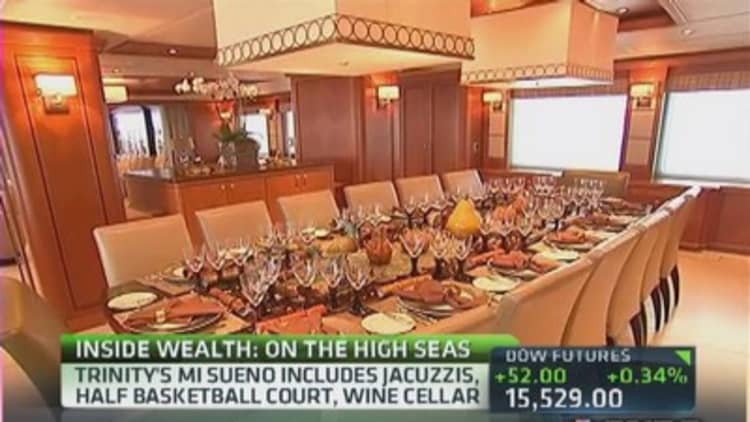When stock prices rise, so do yacht sales. At least, they used to.
Since World War II, there has been a fairly reliable correlation between the stock market and yacht sales. When share prices rise, the wealthy get wealthier and buy more—and bigger—yachts.
This post-recession era, however, is different. Stocks have not only recovered but also reached new highs, yet yacht sales and prices are still under water.
"Stocks are up and the wealth is up, but yachts are not following stocks right now like they usually do," said John Dane III, CEO and president of Trinity Yachts.
(Read more: Ten ways yachts are going high-tech)
Deliveries of superyachts—those more than 30 meters, or around 98 feet—fell to 169 in 2012. This was down from the boom-time level of 261 seen in 2008, according to the (super)Yachting Index from Superyacht Times and Camper & Nicholsons.
Overall, prices are down about 20 percent since 2008, and the number of superyachts being built has also fallen.

Dane said the disconnect could be due to a lack of confidence in the economic recovery—and that while stocks are soaring, the underlying fundamentals of the economy don't inspire enough long-term confidence among the wealthy for them to make a $30 million to $40 million purchase.
(Read more: Wealthy investors spooked by debt crisis)
He also cited the fact that the political and media climate has become more hostile toward the wealthy. Many buyers, he said, are fearful of showing up in the press for buying new, expensive yachts.
"Right now, the wealthy are being vilified in the media," he said. "No one wants to become a target."
Some Russian and Middle Eastern buyers of very large yachts—those over 250 feet—have continued to place orders. The average size of yachts ordered also continues to increase. But the mass of U.S. boating enthusiasts who were buying 120-foot and 150-foot boats in the peak years of 2007 and 2008 has yet to return.
Some industry executives said the slower pace is a more normal market, and that the boom years were an artificial bubble fueled by debt, yacht speculators and customers ordering multiple boats to flip and resell.
"2007 and 2006 was not normal," said Henk de Vries, CEO of Dutch yachtbuilder Feadship DeVries Group. "Things are coming back. But I don't think we can expect 2007 again, at least not for a very long time."
—By CNBC's Robert Frank. Follow him on Twitter @robtfrank.
Watch "Secret Lives of the Super Rich," an all-new series airing Wednesdays at 9 p.m. ET/PT. http://superrich.cnbc.com


